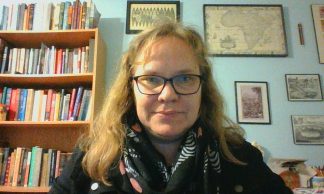By Allison Campbell-Jensen
New Assistant Curator Anne Good is well-suited for the University of Minnesota James Ford Bell Library’s focus on travel, trade, and exploration in the early modern period. After all, she had an early start exploring as a child of missionaries who lived in three African countries while growing up.
“When I was 2, we went to Eritrea,” Good says. “We were there for two and half years. We came back to America for a bit. Then we went to Nigeria for about four and a half years. Then, when I was 11, we went to South Africa. We lived there just before the end of apartheid, actually.
“It was a fantastic childhood,” she says. “It was so interesting to live in different places. I wouldn’t have traded it for anything. Living in different cultures like that changes your perspective on your own.”
A homecoming to the Bell Library
Like most Libraries’ staff currently, Good, who started with the Bell Library July 6, is working remotely. She still lives in Georgia with her husband and two children, although she intends to move to Minnesota at some point.
Still, the position with the Bell is a homecoming of sorts, because Good did her U of M doctoral research in history using materials at the Bell. She researched a German traveler, Peter Kolb, who wrote the most comprehensive 18th-century account of the Cape of Good Hope in what is now South Africa.
Along with Kolb’s original work in German, the Bell has translations in Dutch, English, and French, and shortened encyclopedia accounts. “It’s a treasure trove,” Good says. She also discussed his approach to ethnography — for his contemporary readers, his descriptions of indigenous people at the Cape of Good Hope were particularly popular.
She was drawn back to Minnesota by the Bell’s focus on travel and exploration. “For one thing, the adventure of it” attracts her, she says. “Beyond that, the way that different people and different cultures tried to see each other and to understand each other. It’s so fascinating.”
Perspectives
She appreciates the period she studied but wouldn’t want to live then. “I like the look of the 18th century but if you think about all the difficulties that people had to manage on a daily basis just to live, you’d want to live in the present,” Good says. “Especially since I would not have been an aristocrat; I would have been a peasant. That’s hard.”
Today, she’s pursuing the life of a scholar, which promises engagement. “If you’re doing it right, you always get to learn something new. You can always keep your curiosity going,” Good says. “So that you can take that brain you’ve been given and find out new stuff.”





